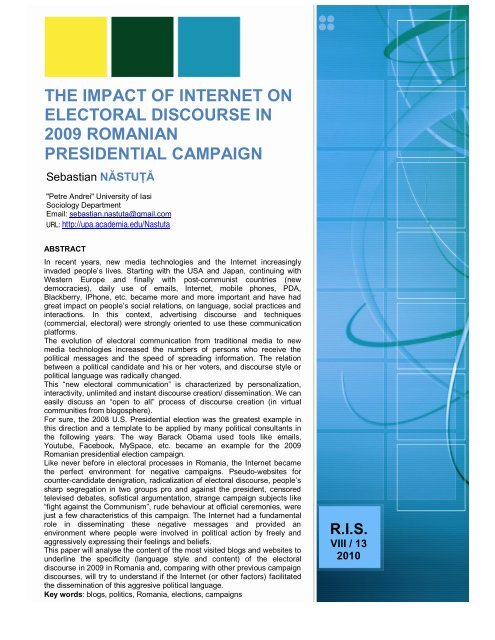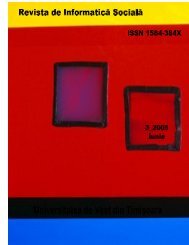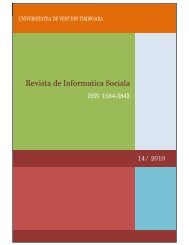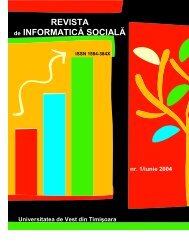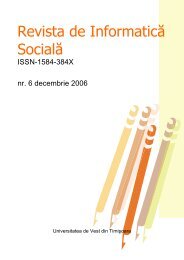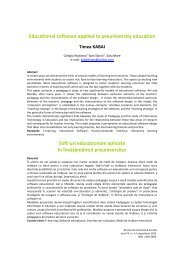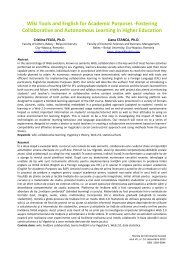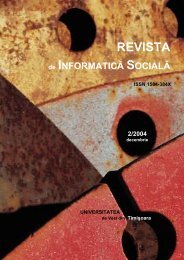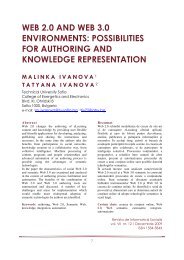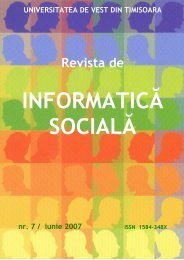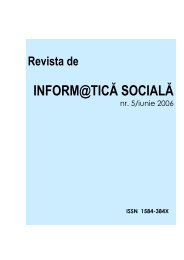No 13 - Journal of Social Informatics / Revista de Informatica Sociala
No 13 - Journal of Social Informatics / Revista de Informatica Sociala
No 13 - Journal of Social Informatics / Revista de Informatica Sociala
You also want an ePaper? Increase the reach of your titles
YUMPU automatically turns print PDFs into web optimized ePapers that Google loves.
THE IMPACT OF INTERNET ON<br />
ELECTORAL DISCOURSE IN<br />
2009 ROMANIAN<br />
PRESIDENTIAL CAMPAIGN<br />
Sebastian NĂSTUȚĂ<br />
"Petre Andrei" University <strong>of</strong> Iasi<br />
Sociology Department<br />
Email: sebastian.nastuta@gmail.com<br />
URL: http://upa.aca<strong>de</strong>mia.edu/Nastuta<br />
ABSTRACT<br />
In recent years, new media technologies and the Internet increasingly<br />
inva<strong>de</strong>d people’s lives. Starting with the USA and Japan, continuing with<br />
Western Europe and finally with post-communist countries (new<br />
<strong>de</strong>mocracies), daily use <strong>of</strong> emails, Internet, mobile phones, PDA,<br />
Blackberry, IPhone, etc. became more and more important and have had<br />
great impact on people’s social relations, on language, social practices and<br />
interactions. In this context, advertising discourse and techniques<br />
(commercial, electoral) were strongly oriented to use these communication<br />
platforms.<br />
The evolution <strong>of</strong> electoral communication from traditional media to new<br />
media technologies increased the numbers <strong>of</strong> persons who receive the<br />
political messages and the speed <strong>of</strong> spreading information. The relation<br />
between a political candidate and his or her voters, and discourse style or<br />
political language was radically changed.<br />
This “new electoral communication” is characterized by personalization,<br />
interactivity, unlimited and instant discourse creation/ dissemination. We can<br />
easily discuss an “open to all” process <strong>of</strong> discourse creation (in virtual<br />
communities from blogosphere).<br />
For sure, the 2008 U.S. Presi<strong>de</strong>ntial election was the greatest example in<br />
this direction and a template to be applied by many political consultants in<br />
the following years. The way Barack Obama used tools like emails,<br />
Youtube, Facebook, MySpace, etc. became an example for the 2009<br />
Romanian presi<strong>de</strong>ntial election campaign.<br />
Like never before in electoral processes in Romania, the Internet became<br />
the perfect environment for negative campaigns. Pseudo-websites for<br />
counter-candidate <strong>de</strong>nigration, radicalization <strong>of</strong> electoral discourse, people’s<br />
sharp segregation in two groups pro and against the presi<strong>de</strong>nt, censored<br />
televised <strong>de</strong>bates, s<strong>of</strong>istical argumentation, strange campaign subjects like<br />
“fight against the Communism”, ru<strong>de</strong> behaviour at <strong>of</strong>ficial ceremonies, were<br />
just a few characteristics <strong>of</strong> this campaign. The Internet had a fundamental<br />
role in disseminating these negative messages and provi<strong>de</strong>d an<br />
environment where people were involved in political action by freely and<br />
aggressively expressing their feelings and beliefs.<br />
This paper will analyse the content <strong>of</strong> the most visited blogs and websites to<br />
un<strong>de</strong>rline the specificity (language style and content) <strong>of</strong> the electoral<br />
discourse in 2009 in Romania and, comparing with other previous campaign<br />
discourses, will try to un<strong>de</strong>rstand if the Internet (or other factors) facilitated<br />
the dissemination <strong>of</strong> this aggresive political language.<br />
Key words: blogs, politics, Romania, elections, campaigns<br />
R.I.S.<br />
VIII / <strong>13</strong><br />
2010


